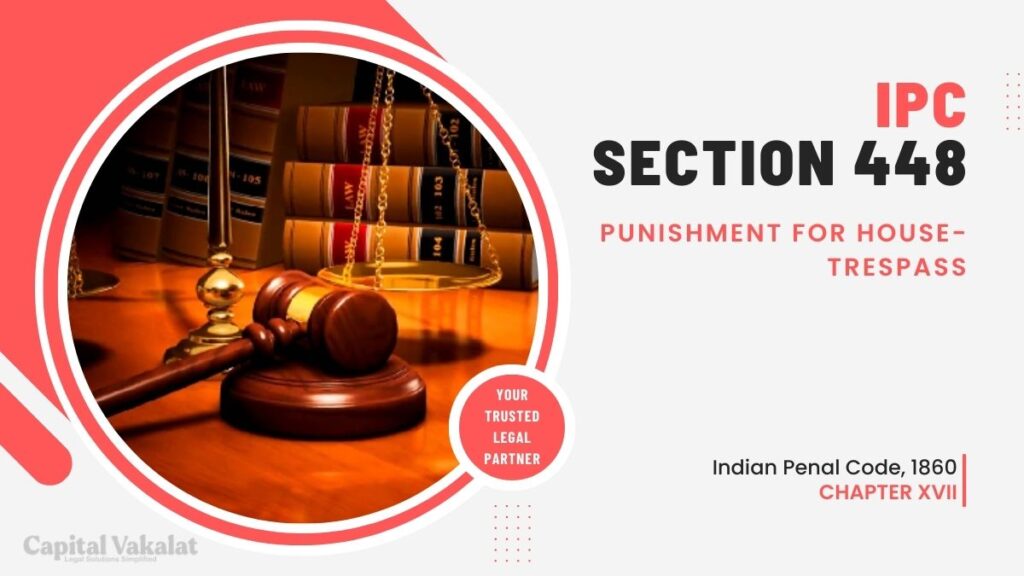Understanding the legal implications of house-trespass is crucial in maintaining order and protecting property rights. Section 448 of the Indian Penal Code (IPC) addresses the punishment for house-trespass, outlining the consequences for those who unlawfully enter another person’s dwelling.

Let’s delve into the intricacies of this section to comprehend its significance in contemporary society.
Understanding Section 448 IPC
Section 448 IPC outlines the punishment for house-trespass, defining the legal consequences for individuals who breach the sanctity of someone else’s home. The section is designed to safeguard the privacy and security of individuals within their residences. To understand its implications fully, we need to break down the legal text and explore the different scenarios covered under house-trespass.
Elements of House-Trespass
House-trespass involves three main elements: breaking into a house, unlawful entry, and an intent to commit an offense. The law requires a deliberate act of intrusion, demonstrating that the perpetrator not only entered the premises but did so with an unlawful purpose. This section aims to differentiate between innocent entry and trespass with malicious intent.
Punishments under Section 448 IPC
The severity of punishments under Section 448 IPC varies based on the circumstances of the trespass. Understanding the factors influencing the punishment is crucial for legal practitioners and the general public alike. Whether the trespass results in damage to property, theft, or other offenses affects the quantum of punishment meted out.
Landmark Cases
Examining landmark cases related to house-trespass provides insights into legal precedents and their implications. These cases serve as examples of how the law has been applied in various scenarios, helping to establish norms and expectations within the legal system. Analyzing such cases sheds light on the judicial interpretation of Section 448 IPC.
Relevance in Modern Society
As society evolves, so do legal provisions. Exploring how Section 448 IPC adapts to contemporary issues highlights its relevance in the modern context. The article will delve into the societal impact of this law, considering changing norms and challenges faced by individuals and communities.
Protecting Property Rights
The concept of property rights is fundamental to understanding the significance of house-trespass laws. Section 448 IPC plays a pivotal role in balancing the rights of individuals to protect their homes with the legal consequences faced by those who violate these rights. This section ensures that property owners have legal recourse in cases of intrusion.
Legal Procedures and Defenses
Understanding the legal procedures following a house-trespass case is essential for both victims and alleged perpetrators. Additionally, exploring possible defenses against charges provides insights into the complexities of navigating the legal system in such cases. This section aims to demystify the legal process and empower individuals with knowledge.
Public Awareness and Education
To foster a lawful society, public awareness and education about Section 448 IPC are crucial. This section will discuss the need for educating the public about the implications of house-trespass, promoting responsible citizenship and adherence to legal norms. Creating awareness contributes to the prevention of such offenses and ensures a safer community.
Conclusion
In conclusion, Section 448 IPC serves as a vital legal instrument in protecting individuals’ property rights and maintaining societal order. By understanding its nuances, citizens can actively contribute to a safer and more secure community. The law not only punishes wrongdoers but also serves as a deterrent, emphasizing the importance of respecting the sanctity of others’ homes.
Frequently Asked Questions
What factors influence the severity of punishment under Section 448 IPC?
The extent of damage, theft, or harm caused during the trespass significantly influences the punishment imposed.
Can someone be charged with house-trespass if they enter a property accidentally?
Section 448 IPC requires intent to commit an offense, so accidental entry without malicious intent is not typically covered.
Are there any defenses against house-trespass charges?
Possible defenses may include proving lawful entry or demonstrating a lack of criminal intent.
How can public awareness contribute to preventing house-trespass?
Educating the public about the legal consequences of house-trespass promotes responsible behavior and discourages potential offenders.